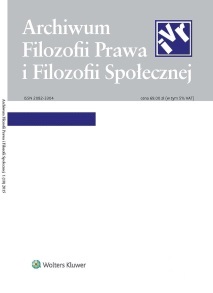On Possible Applications of Paul Ricoeur’s Thought in Legal Theory
On Possible Applications of Paul Ricoeur’s Thought in Legal Theory
Author(s): Marcin PieniążekSubject(s): Law, Constitution, Jurisprudence, Philosophy of Law, Philosophy of Law
Published by: Stowarzyszenie Filozofii Prawa i Filozofii Społecznej – Sekcja Polska IVR
Keywords: Paul Ricoeur; legal positivism; legal interpretation
Summary/Abstract: The paradigm of legal positivism, historically the most important attempt at turning law into science, has been subject to thorough criticism in past decades. The criticism has concerned the most important features of legal positivism, and especially the assumption of separation of law and morality, the dogma of statue being the only source of law, and the linguistic methods of interpreting legal texts. With a crisis of the positive paradigms, the demand for new, humanistic grounds for analysing philosophical and legal questions is intensifying. This is the reason for this article’s attempt to point to the application of Paul Ricoeur’s achievements to the key questions of the philosophy of law. It must be emphasised that his works, and especially Soimême comme un autre, may serve as a foundation for a philosophy of law rejecting the problematic claims about the dualism of being and obligation, the distinction of descriptive and prescriptive languages, and also the separation of law and morality. Thanks to this, the legal topos pacta sunt servanda (agreements must be kept) finds a reinforcement in the ontology of the subject applying law and can be understood as an ethically significant pattern of identity of the self. Equally fruitful seems the possibility of combining the questions of the ontology of the subject applying law with the question of a legal text and its interpretation. The assumption of Ricoeur’s perspective leads to a reduction in the distance between the legal text and its addressee, emphasised by the critics of legal positivism. This rapprochement becomes possible thanks to the connection of the question of the narrative that a legal text is with the question of narrativisation of the subject (i.e. the interpreter of a legal text), being itself in the ipse sense, i.e. applying the law.
Journal: Archiwum Filozofii Prawa i Filozofii Społecznej
- Issue Year: 10/2015
- Issue No: 1
- Page Range: 79-88
- Page Count: 10
- Language: English

